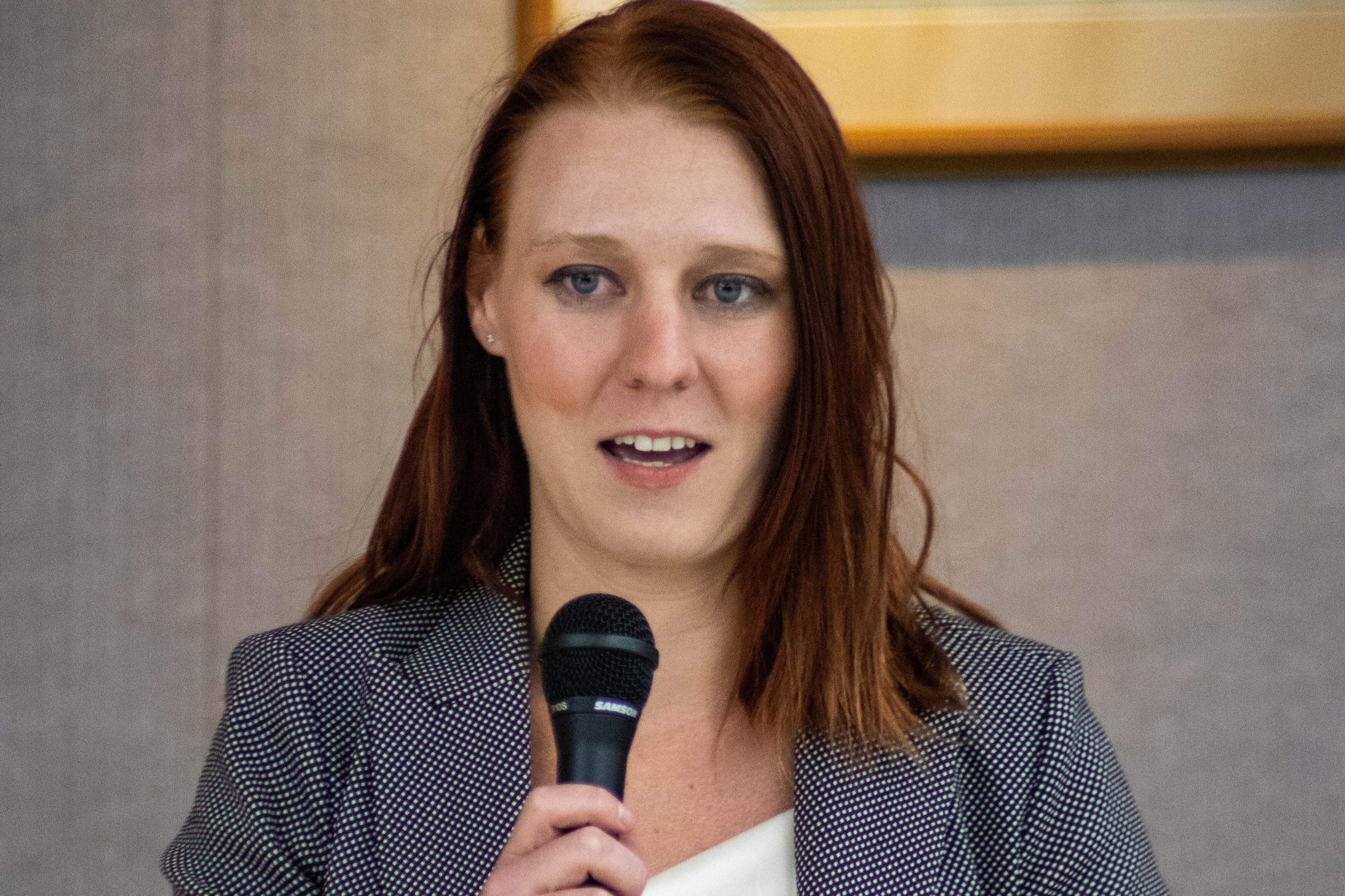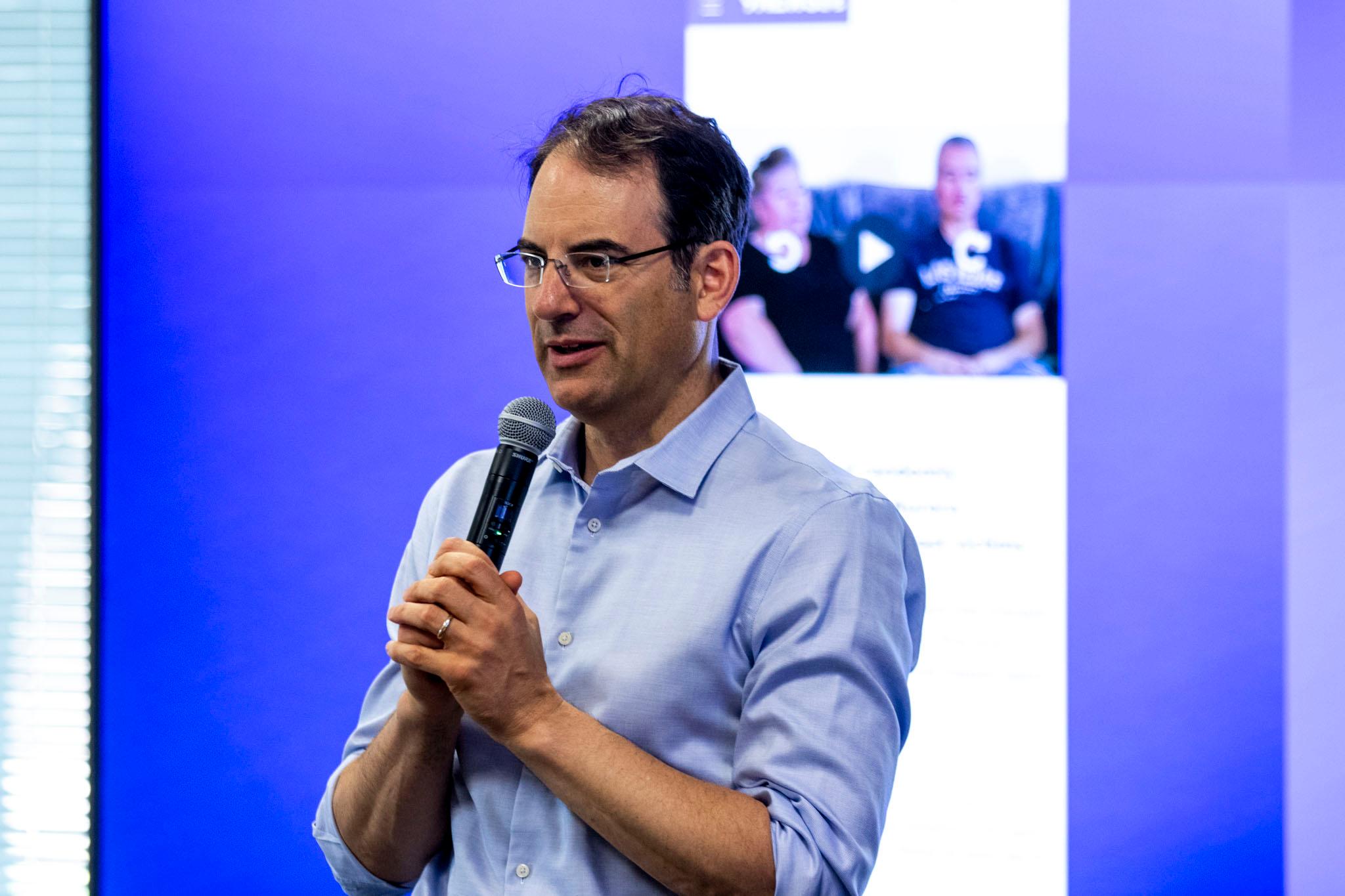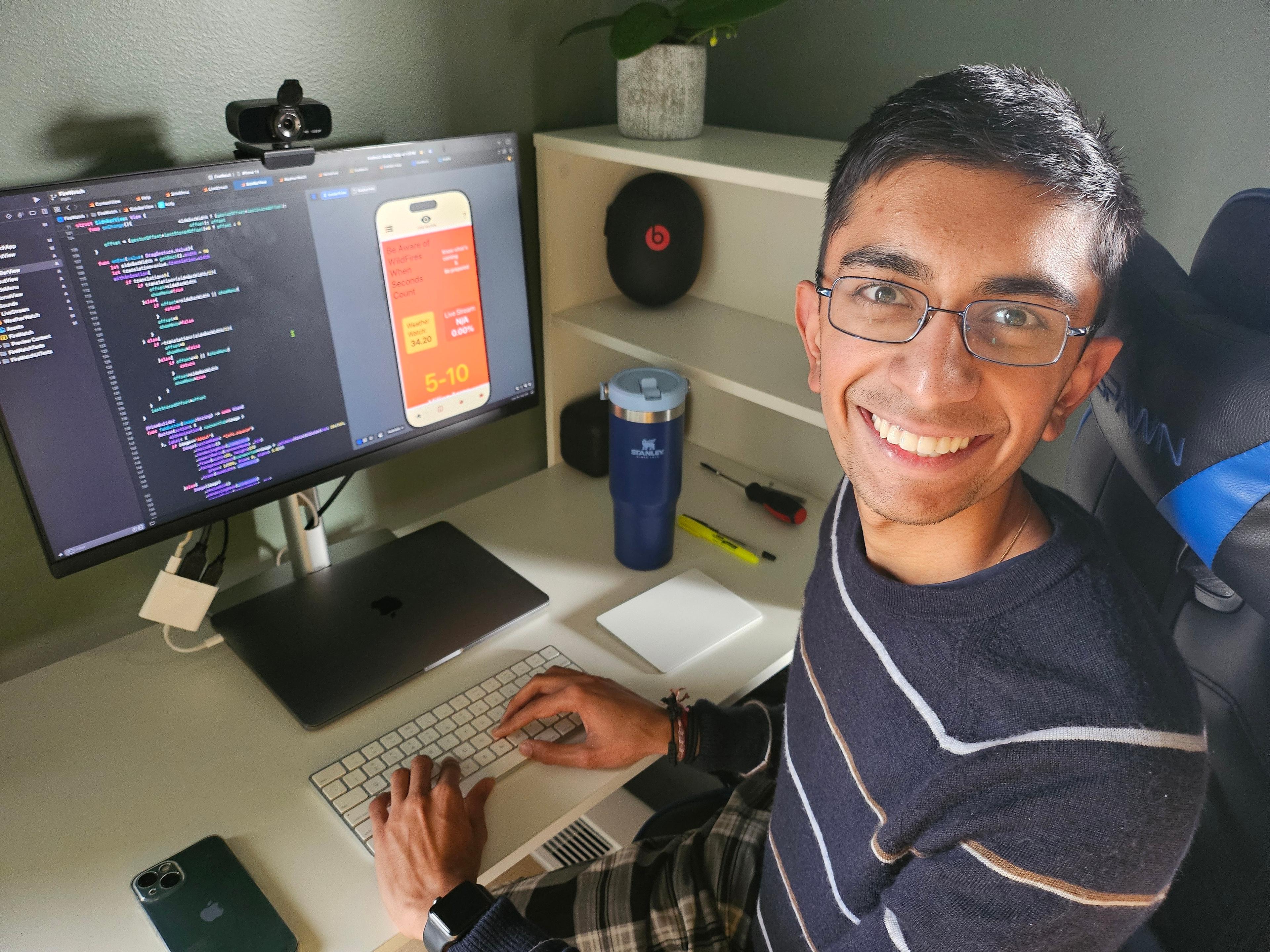
The state's 5th Congressional District, which includes Colorado Springs, is reliably conservative. But the demographics of the state’s second-largest city are changing. Voters elected self-described political independent Yemi Mobolade over former Republican Secretary of State Wayne Williams in 2023. Democrats hope this is the year they send one of their own to Congress.
Democrat River Gassen is a first-time politician, a science lecturer and graduate research assistant at University of Colorado Colorado Springs, with a background in physics.
“A path to victory for myself is just simply be who I am, speak truthfully, and I guess as they say, if you just speak your truth and you search for truth, the truth will set you free so to speak,” Gassen told CPR’s Southern Colorado reporter Dan Boyce.
As a first time candidate, she says, “I wasn't seeing anyone else that I felt like could really be the candidate that could turn this district around. I really felt like we needed a woman in science… I feel like we needed someone who has been impacted by Roe v. Wade and could say,’Hey, I'm going to defend women's reproductive rights.’ And so that's why I ran because I didn't see anyone else like me running and I felt like I could be a good candidate.”
Among Gassen’s priorities: Advocating for veterans, creating an economy that is sustainable and supportive of people’s needs, and water conservation efforts.
This transcript has been lightly edited for clarity.
Dan Boyce: Name a specific problem in your district and why voters should send you to Washington to solve it?
River Gassen: Well, specifically for this district, we are known as the Space Force District and we need leadership that is going to put partisanship on the back burner and fight whoever they need to fight to say, ‘No, this district needs to have Space Force. We need to keep those jobs here. We need to keep those careers here and we need to keep those families here.” People who are joining the military, they're doing so to help their kids. They're doing so to help their futures and to set roots here. You can't just expect them to uproot and move somewhere else. And Space Force offers an opportunity for a lot of people with STEM backgrounds, a lot of people who want to focus on cybersecurity or space exploration to do that while also serving their country. We can't risk moving it and we certainly can't afford that. It'd be a national security threat too.
Boyce: You're a first time candidate, and I understand it was the Dobbs decision, overturning Roe v. Wade, that really pushed you toward being more politically active. Was that a final straw sort of situation? Had you been considering politics before that and then that was just kind of the last bit to get you over the edge?
Gassen: Actually, yeah. I've definitely been considering politics for a while. Nothing really inspired me to really jump into it. I guess you could say. I had a lot of faith in our current leadership and faith that eventually Trump wasn't going to be our president and everything was, for lack of better terms, going to get better. I had faith that the Republican Party might try to return to their original party, who they were, and the Democratic Party might try to become more progressive and we'll make this slow spin in the right direction for lack of better terms, advance as a country as we always have.
But what I saw finally was that we were actually moving backwards and yeah, I would say it was the final straw that made me go, “Okay, if I don't fight for my rights, who is going to fight for my rights?” I wasn't seeing anyone else that I felt like could really be the candidate that could turn this district around. I really felt like we needed a woman in science who could speak on these issues. I feel like we needed someone who has been impacted by Roe v. Wade and could say, "Hey, I'm going to defend women's reproductive rights." And so that's why I ran because I didn't see anyone else like me running and I felt like I could be a good candidate.
Boyce: No Democrat has ever won the fifth Congressional District, census establishment in the early 1970s. It is a solidly conservative district overall. Meanwhile, I think most reasonable people would look at your policy platform and say that you are a progressive Democrat rather than being a centrist. What's your path to victory there?
Gassen: I don't like the labels of progressive or centrist because I feel like it's just designed to divide our party overall. But a path to victory for myself is just simply be who I am, speak truthfully, and I guess as they say, if you just speak your truth and you search for truth, the truth will set you free so to speak. And I feel like people are going to look for that. People are doing their own research. We're moving into an era where most voters are actually going online and looking up the candidates and they want to know about us, and I want to be there to provide as much accurate information about myself. And I feel like if I just stay true to who I am, people are going to respect that.
What I also notice is that in the decades since the establishment of this district, there has been a trend towards the Democratic side. We used to be a consistent 30/70 split for decades, and then in 2006 we had an open seat and had a 13 point jump that moved us into that 40 percent range. Getting those last eight points, it might be a simple matter of having an open seat again, or it might be a simple matter of having somebody run twice for the same seat and building some name recognition. But I do feel like it is possible to flip the seat. Not easy, but certainly possible. And I don't think it really matters too much if it's a centrist or progressive Democrat. I think it's just a matter of a Democrat that is true to themselves.
Boyce: You advocate for universal child care and healthcare. You're opposed to fracking and instead in favor of aggressive renewable energy investment. You're opposed to standardized testing as it currently exists, in favor of a swift and reasonable path to citizenship for new immigrants, and you've expressed some favor for some measure of price controls. I think many people would see those as being progressive stances on issues.
Gassen: I guess. So I feel like a lot of people who don't study economics might confuse Keynesian economics for socialism aspects. I feel like I'm more of a Keynesian, so to speak. But like I said, labels have really just been there designed to kind of divide us. As for universal child care, yeah, I'm a strong advocate for that. I think it's going to build a stronger economy. It's going to help our national security. It's going to give us a smarter generation and it's going to give our kids more resources to learn. My mom's a preschool teacher and she could tell you as she's told me, that there is a difference between the kids who go into preschool, who have been socialized, who have had a structured child care program or whose parents had resources to provide that at home over the ones who didn't have those resources.
And some kids are just not as academically ready to join preschool as a result. And it immediately separates our ability to immediately just introduce challenges for some people, and it's entirely financially-based because child care is expensive. Having the resources to provide a child care-like environment at home is also unlikely for a lot of people. A lot of people can't be single income households. It's not likely anymore. And so I don't really see that so much as a progressive policy so much as something that I genuinely believe, this is something we need to grow our civilization, to make sure that we can have a smarter next generation that is more educated, that has a level playing field, so to speak.
And then universal healthcare is another thing. Healthcare shouldn't be a luxury. Having the ability to get screened for cancer, to go to the doctor when you're sick, to be able to afford your medication, all of those things is what is necessary to just kind of function in your everyday adult life. And I don't really see that as progressive so much as something we just need to have.
Boyce: You have put a lot of focus in your campaign on shoring up social safety nets, and part of that comes from your family background. You experienced real financial hardship during the Great Recession. What do you think should be done to these programs like SNAP or Medicare or Social Security that could practically be done in order to move those programs forward?
Gassen: I would advocate for working requirements, so to speak. So you have to work a certain number of hours a week to qualify for your benefits, unless there is a legitimate reason why you can't. So for example, if you're disabled and you can't work more, then obviously you shouldn't just lose your disability benefits because you can't work more hours. But I wouldn't be opposed to attaching SNAP benefits to the number of hours worked a week or even the ability to increase your SNAP benefits if you choose to work more hours. What I see happening to a lot of families is they have to choose between picking up the extra shifts or no longer qualifying for food stamps. And if they no longer qualify, then they can't feed their kids. What I don't want to see are people unable to dig themselves out of poverty because they're losing their benefits. I'd like to see the benefits instead, incentivize people to move out of poverty instead.
Boyce: The US national debt as of late September, 2024 is $35.3 trillion. It's more than a hundred thousand dollars for every American, and it's expected that this year for the first time in US history will spend more on just our debt interest payments than on national defense. Just shoring up the few of the things that we've discussed so far would be a very expensive proposition. How do you go about that?
Gassen: This is where that Keynesian economic policy comes into play. If you give people more money to spend, they're going to spend that money and stimulate the economy. And when it comes to health insurance, we as a country spend more money on our health insurance than we would as a country if we had a single-payer healthcare system. So overall, we would actually be saving money by having a universal healthcare system as a country.
Boyce: As a country, but not we as a federal government?
Gassen: No, but the individual person would have more money and that is going to help the federal government.
Boyce: How much of a priority should the national debt be?
Gassen: Definitely a high priority. But I also need to ensure that we don't prioritize it over the needs of our constituents. People come first. I don't want to spiral us further and further into debt because what kind of a future is that going to give us? I want to make sure we prioritize the next generation, but what I want to see is an economy that focuses on the future and what is needed for the next generation so that way we have those resources and we don't just have this needless debt that the next generation's going to inherit anyway without having the resources to even be able to give us another generation.
We need health insurance, otherwise women who are pregnant aren't going to be able to go to a hospital and that's going to encourage women to not get pregnant at all because it's too expensive. We need child care so that way people can raise children. We need public education so our population can be more educated. And those things that focus on the next generation, while it may cost money up front, we can't afford to not spend that money because otherwise we're not going to have a generation to even have to be worried about debt because they won't be there.
Boyce: Let's turn back to the military. So there are five military installations in town and much of your focus has been on veterans advocacy. And you also put this priority in our first question here on the Space Force. The economy of the district really rises and falls based on military spending and that may be even more than ever as the military invests in the space and cyber-oriented missions here locally that you've mentioned. For those who have held this seat, what that really means is it means being really scrappy in Congress to fight with other well-deserving cities to get military dollars flowing here, which really at the end of the day, it's supporting the military industrial complex here in the city. How comfortable are you with that prospect of that kind of fight?
Gassen: Well, I don't want to see our national security become threatened, and I fear that that's what's happening right now. And let me explain. The reason I am so focused on veteran care is because if we don't take care of our veterans, we don't have a national military altogether. And here's what I mean by that. We have an entire generation of young people who are hesitant to join the military and our recruitment numbers are suffering because they see how well we treat our veterans and they say, "I don't want that life." They've seen our grandparents come back from Vietnam and have all these PTSD symptoms and weren't told that they were helping our country at all. We've seen the people our age who do go to the Middle East and they're coming back with the worst depression symptoms and now soldiers are dying in higher numbers here from suicide than they are overseas.
Because of all of this, nobody is joining the military anymore, and I don't mean nobody, but it's a very difficult decision for someone to make. And it's so difficult in fact that it's hurting our national security. And so focusing on taking care of those who have served is really the only option.
Boyce: On your campaign website, you say, quote, "It is time for compassionate immigration reform that gives all immigrants a swift and reasonable path to citizenship." What are your thoughts on how the Biden-Harris administration has handled immigration?
Gassen: There are pros and cons. There is a bipartisan immigration bill that I wish got passed and I'm more upset with the Republicans and Congress for voting it down than I am the Democrats who were in favor of it. I feel like Biden and Harris don't have all the resources they need to be able to tackle this because there is so much party division and because, I hate to say it, but Trump's campaign kind of thrives on there being a continuing immigration crisis. There's a lot of things we need to do. We need to increase the number of judges at the border, increase the number of border security agents, but also increase the number of asylum workers there because right now it can take decades to get a path to citizenship. And when your life is on the line and you're genuinely seeking asylum, you can't wait decades.
A friend of mine who moved to the United States when she was four years old, she speaks English as a first language, she got married here in the United States, studied law here in the United States, got her degree here, has her kids here, and only after she got married and have kids was her path to citizenship expedited. But it still took over 20 years, and when it takes over 20 years, you have to say, “Okay, my great-grandmother who came here from Ireland didn't have to wait that long. So why do these guys have to wait so long?” And I don't want to think that race is an element, but it might be. There is a lot going on at our southern border. We do need to be fearful of drug trafficking. We need to be fearful of human trafficking, but we also need to respect that there are human beings who are trying to escape that very violence that we also fear.
Boyce: So the Colorado Springs City Council passed this local resolution declaring the city is not a sanctuary city, and Mayor Yemi Mobolade has often echoed that refrain. Where do you sit on that and what should be done with the new arrivals who've come here in the last year who are stressing local municipal services?
Gassen: Well, I don't disagree that Colorado Springs doesn't have the resources, but that's actually the very problem. They're not going to go away. Immigrants aren't just going to magically disappear because we're a city that doesn't welcome them. We need to focus on getting the resources here in Colorado Springs to be able to take in an influx of people. We don't have those resources right now. We are a very crowded city and we don't have enough houses, we don't have enough water. So I don't really blame the residents here or the city council here for saying, “We don't have the resources; we can't open up.” But we need to start working towards getting those resources because it doesn't look good upon our city, quite frankly, and it's not very empathetic. We need to acknowledge that rather it's immigrants coming in from Mexico or rather it's the homeless population here, we can't just wish the problem away and we need to start to work towards becoming a city that can handle these kinds of situations. And that's going to mean getting more funding here from the state, getting more funding here from the federal government and becoming a city that can handle a higher population.
We need to be smarter with how we're building houses. We need to be smarter with how we're using our water supply. We need to make sure that we prioritize our water for agriculture and we need to make sure that we are building properties here in the city, not luxury apartments downtown that no one can afford. But we need to prioritize infrastructure here and not try to overtake the land in Falcon, for example, because they don't want houses there. And quite frankly, a lot of people who are looking to get a job here in Colorado Springs don't want to live all the way out in Falcon. We need to prioritize the city of Colorado Springs and make sure that we have the resources to grow at the rate that we are.
Boyce: Yeah, so many of those are municipal issues. You're speaking from your place in Congress. You would advocate for those priorities. How?
Gassen: We need more funding. We have a large population and we're one of the largest cities in the country, definitely in the top 100, but we are not ranked that high when it comes to funding. We need more funding, plain and simple.
Boyce: You mentioned water conservation, and I was struck by the degree to which you put that as a focus and you correctly point out that well over 80 percent of the state's water use goes toward agriculture and irrigation. And then meanwhile, Colorado Springs is also a city that doesn't have enough water here locally to sustain this population. Of course we need to pipe it over from the mountains. How do you ride the line of wanting to put proper focus around agriculture and trying to make agricultural practices more water efficient in the state? How do you put focus on that when the district itself is not really a rural district, it's an urban district?
Gassen: Well, as a county, I'm going to zoom out for a little bit and look at El Paso County. I do believe we need to prioritize water in areas like Falcon which is growing a good portion of food compared to here in Colorado Springs, but there are more people here in Colorado Springs. Roughly two-thirds of the water in our counties is being used for agriculture, which is good, but also roughly two-thirds of the people here in Colorado Springs are renting. They don't have a lawn. I'm one of those people.
And so while we've had a decrease in water usage as our populations increased here, it's also been largely the result, at least from my perspective, of people going from living on two-acre size properties to moving into an apartment. Colorado Springs is a town that's developing more apartments, more townhomes, smaller living units, quite frankly. And I'm not opposed to having a smaller house, quite frankly, less space to clean, but I would like to have a yard someday so that way when I get older and decide maybe I want to start a family, I could have a yard for them to play in because right now, where would I even put a nursery in my 600 square foot apartment? And I think a lot of young people are in that position right now.
Getting back to water, I got a little bit off-topic there for a second, we need to be smarter about our water usage, and so that's going to mean prioritizing the type of housing that is going to be using less water, the type of land development that's going to be using less water and not giving these property developers free-range to do whatever they want with our land. We need to prioritize it in a way that protects our environment and our people here. We also need to focus on making sure that we can have drought-resistant land and areas that encourage the land that we do have that we are watering. And so for those people who do have lawns and those one acre size properties or two acre size properties, incentivize them to be using less of our water.
When only a third of the residents here are landowners, we need to make sure they're not taking water from the rest of us. We need to maybe offer tax subsidies that say, "Hey, if you replace that grass lawn with something more drought-resistant like clover or sage or grow a tomato garden even, we will give you a little bit of the money that you spend on our taxes back because now you're protecting the environment." Maybe programs like that I think is where we need to go. But for the majority of the population here in Colorado Springs, we really have very little say, and it can be very frustrating because what am I doing for water conservation? The thing that takes up most of my water is probably the five-minute shower I'm taking, and that doesn't really take out much water in the grand scheme of things.
Boyce: Those priorities that you mentioned, largely those would fall within the purview of municipal government to manage the proposals you're talking about. What would you do in Congress?
Gassen: I would want to give the Environmental Protection Agency some more teeth in that regard. I would want to see them focused on helping cities lay out their foundation for where their properties can develop as opposed to the situation we currently have, which is the city going, “Oh, we need more money. Let's sell this land to the property developers. Oh, the property developers are not managing the land.” Then it costs the city money. And then in order to get more money, we have to sell more land, and then the cycle just gets worse and worse. That's not sustainable. So I'd want to invite the Environmental Protection Agency into working with the individual cities and the state governments as well.
Boyce: What have you learned just as a first time candidate running for office, what have you learned about the political process and what have you learned about yourself?
Gassen: Well, what I've learned about the political process is that it's going to be a hell of a lot cheaper if I ever do it a second time, 'cause then you already have the yard signs and the infrastructure in place and the call list in place and you'll know who to hire, and you're not wasting money on trying to figure out who's the best employee for the best job, like starting a small business, I suppose. So that's on the campaign side.
And then, gosh, I guess what I've learned about myself is that I really need to make sure that I maintain who I am and stay true to that. It's really easy to get thrown into this cycle where a lot of people say, “It's not possible to win, don't even bother. Or you're taking resources away from other districts.” And at the end of the day, I just need to, not to sound clingy here, but do my best and I also need to make sure I'm prioritizing my own mental health throughout all of this and making sure that at the end of the day I can look back and be proud of everything I've said and everything I've stood on because I'm going to be standing here for a minute. And so I want to make sure that people know who I am and I build that reputation, I suppose.









